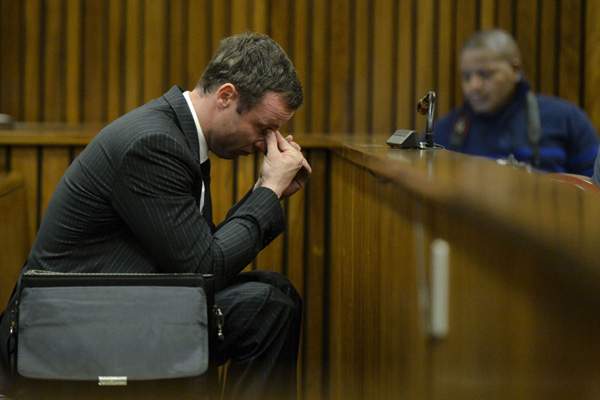Pistorius lawyer: Athlete's anxiety led to killing
Updated: 2014-08-08 20:55
(Agencies)
|
||||||||
|
 |
|
South African Olympic and Paralympic sprinter Oscar Pistorius sits in the dock during the closing defence arguments in the North Gauteng High Court in Pretoria August 8, 2014. [Photo/Agencies] |
PRETORIA, South Africa - Oscar Pistorius' lawyer slammed his hand onto a desk in a South African courtroom Friday to mimic the sound he says startled the disabled athlete and caused him to fire shots through a toilet stall door, killing his girlfriend.
Chief defense lawyer Barry Roux presented his closing arguments in the trial of the Olympic runner, who is charged with premeditated murder for shooting dead Reeva Steenkamp in his home.
|
Following are possible outcomes: - If convicted of premeditated murder, Pistorius faces a mandatory life sentence, meaning he will be behind bars for 25 years before he can be considered for parole. - Masipa can also convict Pistorius of murder but without explicit premeditation, a lesser crime that still carries up to 20 years in jail. The sentence can be reduced on presentation of "substantial and compelling" circumstances. - If Masipa is not convinced of Pistorius' intent to kill, he could still be jailed for culpable homicide - equivalent to Britain's manslaughter - based on negligent or reckless discharge of his 9mm pistol into the toilet door. Culpable homicide carries a maximum of 15 years behind bars. - Alternatively, Masipa could accept Pistorius' primary argument of 'putative self-defence' - meaning that he fired into the door because he genuinely believed his life to be in danger from a perceived intruder - and acquit him. In addition to the murder charge, Pistorius is accused of three lesser weapons offences: one count of illegal possession of ammunition and two counts of discharging a firearm in a public place. These charges carry up to five years in prison, although in most instances are punishable by a fine. |
"You're anxious. You're trained as an athlete. He stands now with his finger on the trigger ready to fire," Roux said, describing the highly fearful mindset he says double-amputee Pistorius was in when he killed Steenkamp by mistake on Valentine's Day last year thinking she was a dangerous intruder.
"He stands there and ..." Roux continued before suddenly hitting the wood surface in front of him to create a loud thump sound, arguing Pistorius fired on "reflex."
The chief prosecutor in the blockbuster trial, which is being televised globally, on Thursday dismissed Pistorius' entire story as an elaborate lie and urged Judge Thokozile Masipa to convict him of premeditated murder, a charge that carries a sentence of at least 25 years and up to life in prison. South Africa does not have trial by jury, nor does it have the death penalty.
Pistorius pleaded not guilty to murder and three separate firearm charges. His lawyer, however, conceded that he was guilty in one of those firearm charges, of negligently firing a gun in a public place in an incident in a restaurant weeks before the killing. Prosecutors have used those firearm charges to paint Pistorius as a hot head who was obsessed with guns, not the vulnerable figure his defense puts forward.
As his months-long trial approached its conclusion, with Friday scheduled to be the last day of arguments before the judge retires to consider her verdict, Pistorius sat on a bench behind his lawyer, wearing glasses and mostly looking straight ahead. Gerrie Nel, the prosecutor, has accused the once-celebrated multiple Paralympic champion of being an "appalling witness" who lied constantly during his testimony to try to cover up a murder after a fight between the couple.
But Roux said Pistorius' disability had made him particularly vulnerable and anxious about crime over the years, comparing him to a victim of abuse who kills an abuser after a long period of suffering. Pistorius' disability having had his lower legs amputated as a baby, and his long-held fear of being attacked, played a central role in an accidental killing, Roux argued.
"I do not have legs, I cannot run away, I am not the same," Roux said to try and explain Pistorius' decision to go to the bathroom and confront a perceived intruder rather than escape, a decision the prosecution says showed Pistorius wanted to kill someone and so is guilty of murder. Pistorius did not have his prosthetic legs on and was on his stumps when he shot Steenkamp.
Referring to some of the defense's argument already submitted to the court in a 243-page document, Roux said there were contradictions in testimony by some neighbors who said they heard a woman screaming on the night that Pistorius shot Steenkamp, suggesting a fight. Roux said high-pitched screams came from Pistorius as he called for help after the shooting, and that the athlete's timeline of the sequence of events, including telephone calls, on the night of the shooting matched the testimony of key trial witnesses.
Roux also alleged that items in Pistorius' bedroom, near the bathroom where he killed Steenkamp, may have been moved around by investigating officers, repeating the defense's allegation that police tampered with evidence, albeit unintentionally.
"There was no respect for the scene," Roux said of the police investigation.
The positioning of bedroom items, including a fan, a bedcover and a pair of Steenkamp's jeans, are important because, in police photographs, they were not in the places where Pistorius said they were before the shooting, leading prosecutors to argue that Pistorius is lying.
Pistorius could also be convicted of a lesser murder charge or negligent killing, both of which call for years in jail. Judge Masipa could acquit him if she believes he only made a tragic error. Masipa was expected to adjourn the trial at the end of proceedings Friday to deliberate on a verdict with the help of two legal assistants.
Imray reported from Stellenbosch, South Africa.

 Star Stefanie Sun holds concert in Beijing
Star Stefanie Sun holds concert in Beijing
 Faye Wong's manager refutes star's drug rumors
Faye Wong's manager refutes star's drug rumors
 Lu Yi and daughter Bei Er pose for street snaps
Lu Yi and daughter Bei Er pose for street snaps
 Photoshoots of actress Li Xiaomeng
Photoshoots of actress Li Xiaomeng
 Council of Fashion Designers of America Awards
Council of Fashion Designers of America Awards
 Fan Bingbing, first Chinese actress in Barbie Hall of Fame
Fan Bingbing, first Chinese actress in Barbie Hall of Fame
 Awarding ceremony of 2014 hito Pop Music held in Taipei
Awarding ceremony of 2014 hito Pop Music held in Taipei
 Zhao Liying's photo shoot for Children's Day
Zhao Liying's photo shoot for Children's Day
Most Viewed
Editor's Picks

|

|

|

|

|

|
Today's Top News
Pandas find friend in World Peace
Obama authorizes targeted airstrikes in Iraq
New Guangzhou-NYC flight 'a gift'
China's mobile gamer lists at Nasdaq
Will Chinese tourists 'heart' New York too?
Hagel in New Delhi to expand defense ties with India
Scale of Ebola crisis 'unprecedented'
Compromise called for in Sino-US ties
US Weekly

|

|







